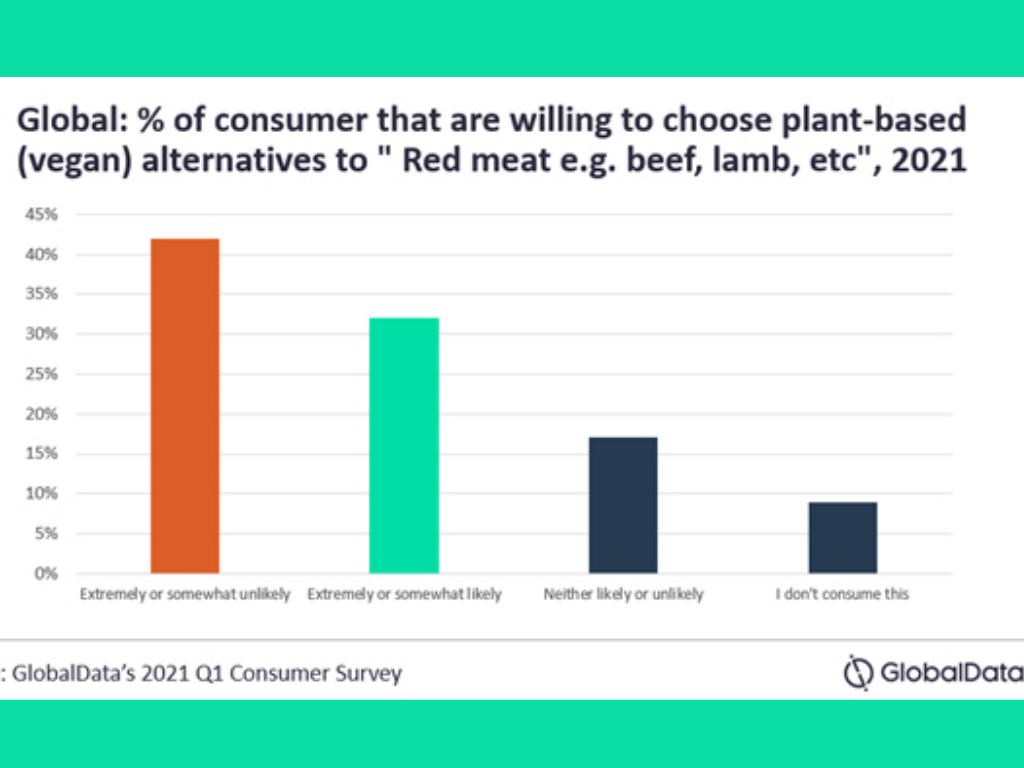GlobalData Urges Food Brands: Meat Eating Experience Must Be Replicated To Transition To A Sustainable System
4 Mins Read
According to data found by a 2021 Q1 consumer survey conducted by data and analytics company, GlobalData, 42% of global consumers said that they wouldn’t choose plant-based and vegan alternatives to conventional red meat, and to address this, the company has urged all brands and companies to work on replicating the taste, feel and other components that make up the meat-eating experience in plant-based alternatives for these consumers to easily transition to diets that are sustainable for themselves and the planet.
According to a new survey conducted by London-headquartered GlobalData, 42% said they probably wouldn’t switch to plant-based alternatives while 32% said they would prefer these options compared to traditional red meat.
To help those that are not sure of transitioning to plant-based alternatives and to refrain from alienating them, GlobalData advises manufacturers to work on developing meat-eating experiences without the use of animals in order for these consumers to support sustainability and consume products that align with the ‘green’ narrative.
In a press release seen by Green Queen, senior Innovation Researcher at GlobalData, Khalid Peerbaccus, said that 42% is a huge number that we can’t just avoid and need to include in the sustainability conversation.“While 32% of shoppers globally say that they are likely to choose plant-based alternatives to red meat, 42% state the opposite. A significant number of people are simply not buying in, and it is likely because they are sticking with what they know. Some brands, such as Epicurious – which recently decided to omit beef from its recipes – could risk alienating followers while trying to tap into the plant-based trend. To win over those unsure consumers, these brands must focus on replicating the meat-eating experience without the need for animal products.”

A significant number of people are simply not buying in, and it is likely because they are sticking with what they know. Some brands, such as Epicurious – which recently decided to omit beef from its recipes – could risk alienating followers while trying to tap into the plant-based trend
Khalid Peerbaccus, senior Innovation Researcher at GlobalData
In addition, 27% said that the reason they opted for plant-based alternatives instead of red meat is due to sustainability and green credentials and 33% stated that for animal welfare reasons, they made the switch.
Peerbaccus added: “While animal welfare is an issue that causes many shoppers to look for alternatives, sustainability is not too far behind. This is in no small part due to the increasing media coverage regarding climate change and the emphasis put on the consumer to help effect that positive change in the long run. One of these is to adopt a more sustainable way of eating, which includes taking into consideration the journey the food has taken to get to the plate.”
While animal welfare is an issue that causes many shoppers to look for alternatives, sustainability is not too far behind. For consumers to help effect positive change in the long run, adopting a more sustainable way of eating, which includes taking into consideration the journey the food has taken to get to the plate is important
Khalid Peerbaccus, senior Innovation Researcher at GlobalData
Furthermore, Peerbaccus said that there are existing manufacturers that are understanding the needs of ethical consumers and are working to meet them. “Importantly, many are attempting to replicate the meat-eating experience through both taste and texture, which will be a key component going forward in weaning those unwilling consumers away from meat in favor of more sustainable alternatives.
Elsewhere, in a report by multinational consultancy Ernst & Young (EY), given the increasing trend of alternative proteins in the market and the massive scaling that is taking place, this sector “promises substantial disruption” to the conventional animal meat market which will put pressure on businesses to align themselves to sustainability goals to “stay ahead in the food value chain space”.
Furthermore, according to an Oxford University 2019 study, plant-based proteins are more environmentally friendly given that they have found to have a smaller carbon footprint as well as switching to these diets is important to achieve the Paris agreement goals.
Read: This Q&A w/ Philippines Plant-Based Pioneers WTH Foods Explaining That Taste Is Factor #1 When You Market To The Masses
Lead image courtesy of Greenforce.




